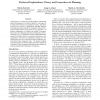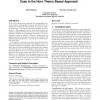5205 search results - page 123 / 1041 » Tilings and model theory |
EAAI
2010
13 years 3 months ago
2010
A model of honey bee social foraging is introduced to create an algorithm that solves a class of optimal resource allocation problems. We prove that if several such algorithms (&q...
AAAI
2011
12 years 9 months ago
2011
In this paper we examine the general problem of generating preferred explanations for observed behavior with respect to a model of the behavior of a dynamical system. This problem...
ROBOCUP
2004
Springer
14 years 2 months ago
2004
Springer
The paper discusses a top-down approach to model soccer knowledge, as it can be found in soccer theory books. The goal is to model soccer strategies and tactics in a way that they ...
CCS
2008
ACM
13 years 11 months ago
2008
ACM
In the Horn theory based approach for cryptographic protocol analysis, cryptographic protocols and (Dolev-Yao) intruders are modeled by Horn theories and security analysis boils d...
ECAI
2006
Springer
14 years 21 days ago
2006
Springer
Abstract. Computational Game Theory is a way to study and evaluate behaviors using game theory models, via agent-based computer simulations. One of the most known example of this a...


